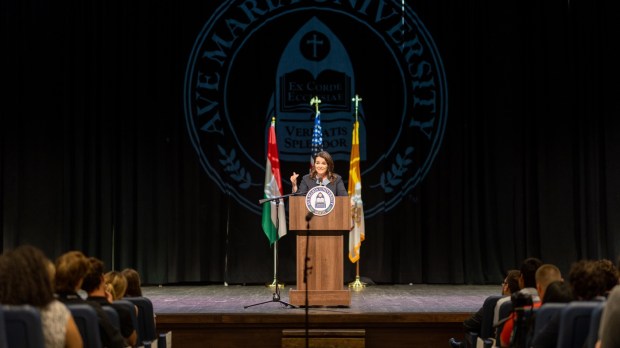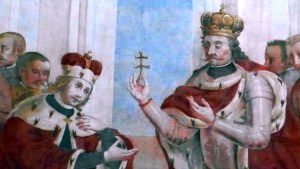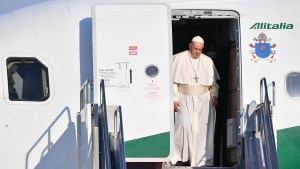The president of Hungary, Katalin Novák, visited Ave Maria University in Florida this past week and shared her vision of how to build a Christian society.
Last March, Novák became Hungary’s first female president, a largely ceremonial role. She will welcome Pope Francis to the country when he visits Budapest in late April.
At her talk at Ave Maria on Thursday, she said she had just met with Florida’s Republican Governor Ron DeSantis, widely expected to run for president in 2024. She said she came to Ave Maria because she wants to recognize smaller institutions of higher learning and to encourage students, who are potential future leaders of society.
Last fall, Novák addressed students at Benedictine College in Atchison, Kansas.
At Ave Maria, she emphasized Hungary’s 1,000-year history, which was established as a Christian state by St. Stephen of Hungary, its king.
“His choice just defines our existence ever since, and we don’t deny our founding father St. Stephen, but we emphasize our Christian identity and our Christian culture … on a daily basis,” she said.
Novák was Minister for Family Affairs from 2020 until 2021, in the government of Viktor Orbán, prime minister since 2010. She said that because of government policies encouraging marriage and childbearing, the past 10 years have seen abortions decrease by a third and the fertility rate grow from 1.2 to 1.6.
“There were times not so long ago when there were … way more abortions than births,” she recalled. Many women had abortions “because of the lack of knowledge, because of the bad era that we lived in.”
She was referring to 40 years of communist rule, when “there was not a real knowledge about the importance of life.”
Children and the future
Today, she said, Hungary spends 6% of its gross domestic product on family support – three times the amount NATO countries spend on defense. The government offers housing subsidies for young married couples and tax breaks for childbearing.
“The more children you have the less personal income tax you pay,” Novák said. “If you have at least four children as a mother you have full exemption from personal income tax-paying, lifelong. So once you have four children you don’t pay any personal income tax, ever.”
Also, student loans are forgiven according to the number of offspring a person has – with three children leading to complete forgiveness of the debt.
“We think if there are no children there are no families, there is no future; it’s as simple as that,” Novák said. “Children are the guarantees for our future.”
In 2011, Hungary adopted a new Constitution, which specifically states that life should be protected from the moment of conception. A mention of that in Novák’s speech, as well as reference to the Constitution defining marriage as “the union of one man and one woman based upon their mutual consent,” received enthusiastic applause from the audience, which consisted of students, faculty and residents of Ave Maria, Florida.
The Ave Maria planned community – along with the university – was founded by Catholic entrepreneur and philanthropist Tom Monaghan as a place where Catholic values would take precedence in civic life.
Responding to a student’s challenge as to why Hungary does not ban abortion outright, Novák said that she sees greater potential in trying to build a culture of life through education.
“What I am working on personally as well is that we have to teach about the importance of life at a very young age,” she said. “So we have to start with the children. We have to make them understand how precious human life is.”
Sovereignty
Another important aspect of Hungarian Christian culture, she said, is sovereignty – both national and personal. Hungary is a member of both the European Union and the North Atlantic Treaty Organization, but is determined to make decisions based on what is best for Hungary.
“We stick to our national identity, so for us our national sovereignty is something that nobody can take away from us,” Novák insisted. “It is also very important to have sovereign persons in the country and to respect each other’s sovereignty.” That means respecting one another’s human dignity.
“Real human dignity means for me that we really do respect the other,” she said, while cautioning against a contemporary understanding of tolerance.
Some “make us believe that tolerance means that you deny your personal convictions, that you deny our personal identity so that you can be tolerant with the other, so that you can be respectful with the other,” she said, summing up a recent trend in society. “That is actually not true. So I can only be a good Christian and respect the non-Christian, let’s say, belief or non-belief of anybody if I … stick to my Christian conviction and never give it up. That is the way to become really tolerant. That is the way to really be respectful with others, no matter what they think about the life.”
In this regard, the president echoes the teaching of Pope Francis, a passionate defender of dialogue, but also of personal conviction. He has said:
Dialogue does not mean renouncing one’s own identity when it goes against another’s, nor does it mean compromising Christian faith and morals. To the contrary, “true openness involves remaining steadfast in one’s deepest convictions, clear and joyful in one’s own identity” (Evangelii Gaudium) and therefore open to understanding the religions of another, capable of respectful human relationships …
Personal vocation
Aside from politics and policy, Novák offered her own personal example of how individuals can contribute to the building up of a Christian culture. Her marriage, for example, was a decision that she and her husband made 21 years ago to “stand by each other, and the decision that we make on a daily basis, not once but several times a day, that that is just something that makes me aware to be where I am and who I am and also what I became.”
She has degrees in law and economics and has worked in government since 2001, but she decided to temporarily withdraw from her career when she and her husband were having and rearing children.
At one point in her life, she said she realized that her “real job” was motherhood, and that “the only place I am irreplaceable is in my family – no other place.”
Novák is a Reformed Christian. In her address, she spoke about beginning each day reading the Bible and meeting every other week with a Christian prayer and discussion group, which she says helps her in her decision making.
“My Christian faith, my Christian identity, is also very decisive for me on a daily basis, and these values are the ones on which I can rely and which I can be sure that I will make good decisions.”
Born in 1977, when the country was still communist, she said that she was baptized secretly in her grandparents’ home and that religious Hungarians had to hide their faith. “You couldn’t confess it publicly at all,” she said. “You couldn’t attend the Mass. You couldn’t go to church. … or if you did then you risked having consequences.”
Hungary still suffers long-term consequences from that suppression of faith. “There was not only one but at least two generations raised without this everyday experience of living in a faithful community or experiencing the beauties of living our faith together and publicly, which is also important,” she pointed out.
But “what we can do and what we are doing is to concentrate on the future generations and the children. And I see a positive change and I see that now more and more kids also attend church schools,” which are free, “and so now they start to educate their parents, and I just very much hope that it will drive change in future generations. But it takes time. And you know it is very, very easy to destroy something, but it’s very difficult to build or rebuild something. That’s what we’ve been working on for more than a decade and that’s what we have to still work on for a long time.”
Novák’s talk is available on YouTube:



